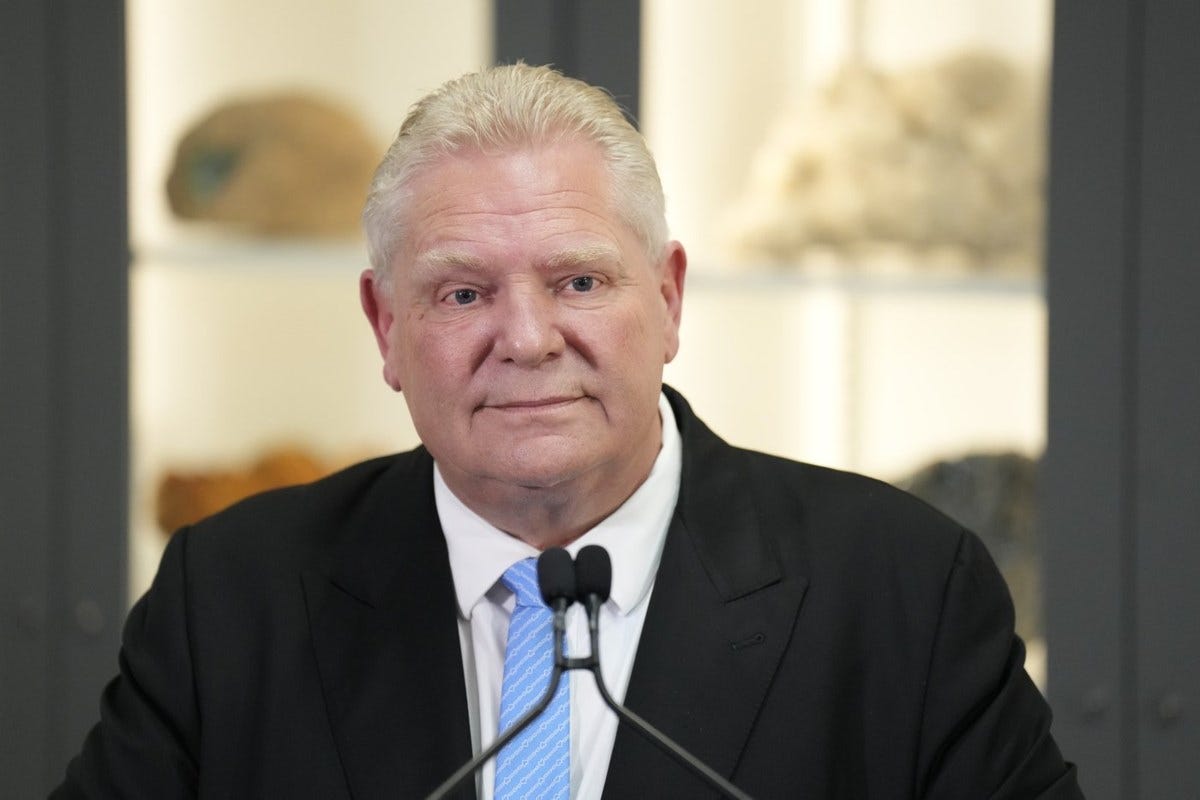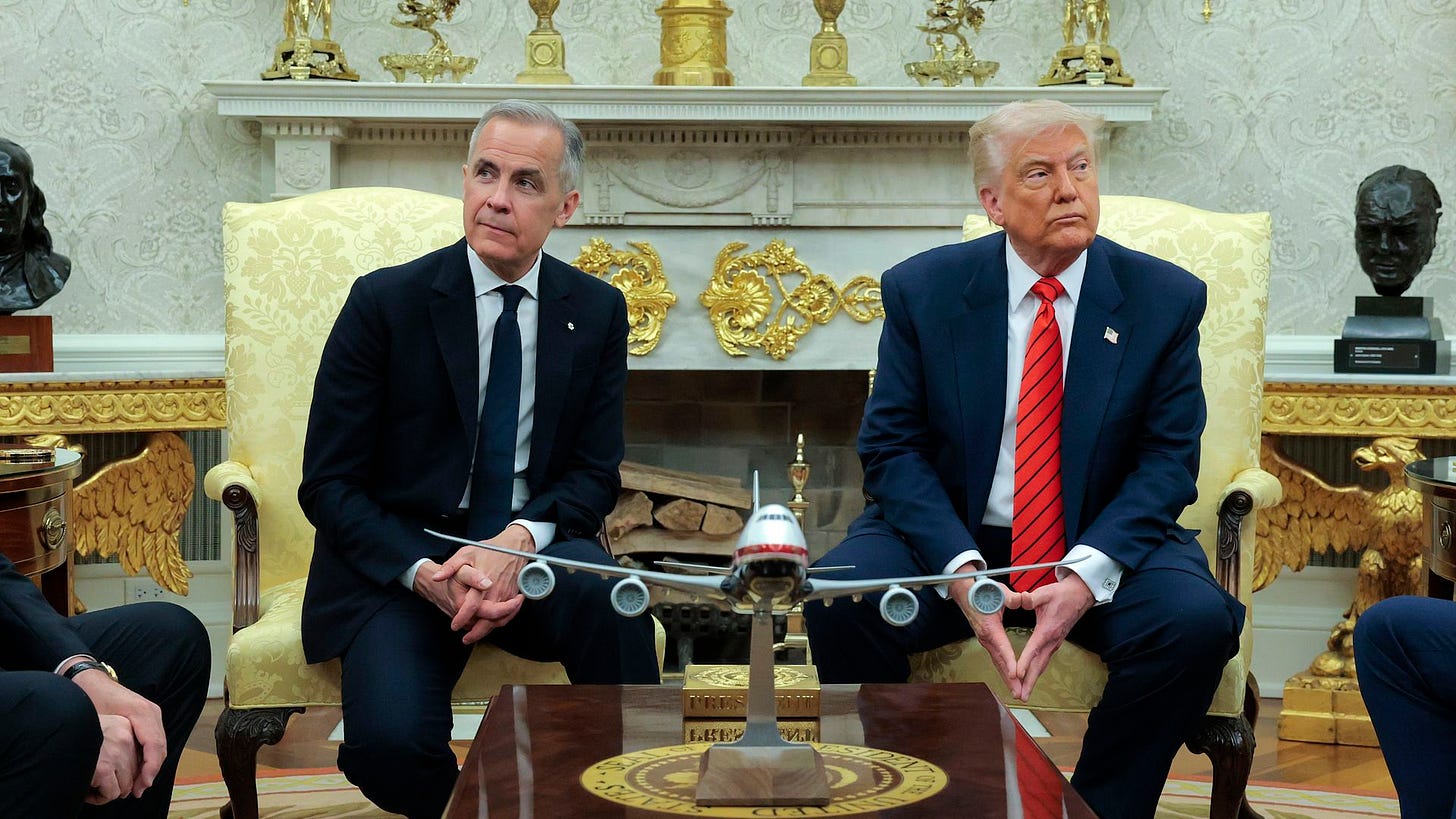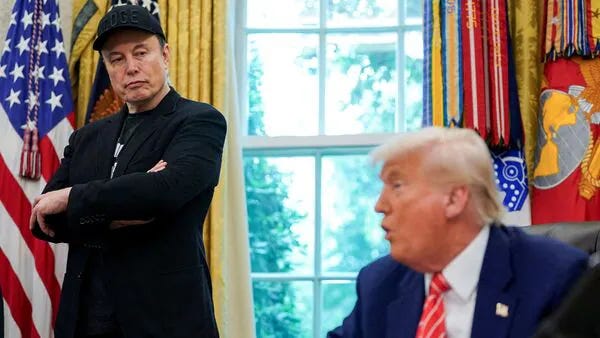Good morning, It’s Thursday, June 7th. In today’s news, Ontario declares war on DEI in schools and universities, The politics of perception and the quiet war over language in Canada, Carney and Trump quietly negotiate a trade and security framework, Israel to seize Gaza aid flotilla and arrest Thunberg along with other A-list activists, and much more.
First time reading the daily blend? Sign up here.
Ontario Declares War on DEI in Schools and Universities
Ontario Premier Doug Ford’s government has quietly delivered one of its most ideologically significant moves yet—introducing sweeping reforms that signal the decline of Diversity, Equity, and Inclusion (DEI) as a governing framework for the province’s schools and universities.
Though not explicitly framed as a war on DEI, Bill 33 unmistakably shifts power away from activist administrators and toward a more centralized, merit-based education system. The proposed legislation demands that postsecondary institutions admit students on the basis of merit—not identity. That means no more unspoken quotas or “equity adjustments” that prioritize group membership over academic achievement. While critics decry the move as a threat to underrepresented students, defenders see it as a rebalancing—a return to the idea that fairness means equal treatment, not unequal outcomes.
The bill also tightens control over school boards, particularly in large cities where progressive ideology has flourished with minimal oversight. Toronto’s attempts to erase figures like Sir John A. Macdonald and Egerton Ryerson from school names are now blocked, as the province bans ideologically driven renaming campaigns. And with the reinstatement of school resource officers, the province is signaling that it values public safety and rejects the anti-police narratives pushed by some boards in recent years.
Perhaps the most significant change is the sweeping authority the government is asserting over trustees. Under the new legislation, the education minister becomes a de facto “trustee-in-chief,” empowered to override local decisions and enforce fiscal discipline. After revelations of absurd spending—like a $190,000 art-buying trip to Italy—Ford’s move is as much about cleaning house as it is about ideology.
DEI defenders are already pushing back, arguing that these policies undermine efforts to support racialized and disadvantaged students. But Ford’s team is betting that the public is tired of activist-driven education that prizes political gestures over performance. As Education Minister Paul Calandra bluntly put it, schools need to “put students first—not politics, not bureaucracy.”
This is not just a policy shift; it’s a cultural one. Ontario is saying no to race-based admissions, bureaucratic vanity projects, and politicized classrooms. It’s a message to activists: education is not your playground. And to parents, it's a promise—your kids' classrooms are for learning, not indoctrination. Source.
The Politics of Perception: The Quiet War Over Language in Canada
In Canada, the words politicians choose aren’t just semantics—they shape how the public understands divisive issues like immigration, climate policy, and identity. When governments deliberately alter language—calling illegal border crossings “irregular migration” or rebranding the “carbon tax” as “pollution pricing”—they’re not just avoiding controversy, they’re actively reshaping reality. And when media and educational institutions adopt this language without question, it steers the entire national conversation.
During efforts to prevent Trump-era US tariffs, Ottawa began using the term “illegal migration” again—a term it had replaced with “irregular migration” in 2018 to match more inclusive trends. Similarly, the Liberals rebranded the “carbon tax” as “pollution pricing” or the “Canada Carbon Rebate” to make it more palatable, until public backlash and Mark Carney’s leadership led to its repeal in 2025.
Critics argue these rhetorical shifts aren't neutral. Language manipulation is being used to shape public perception and obscure inconvenient truths—from calling euthanasia “medical assistance in dying” to pushing ideologically charged terms in gender identity debates. Scholars like Marco Navarro-Génie and David Haskell warn that when media, schools, and politicians unquestioningly adopt such language, it can lead to a distortion of reality and a kind of soft authoritarianism.
The concern isn't just what words are used—but who decides which ones we’re allowed to say. Critics point to examples like the government's 2017 gender expression bill, which they say flirts with compelled speech. Others note the media’s selective neutrality, calling pro-life protesters “anti-abortion” or vaccine skeptics “anti-vaxxers,” while refusing to label terrorist groups like Hamas as such.
The deeper issue, Navarro-Génie argues, is when language is no longer bottom-up—from the people—but top-down, from a government trying to control how we think. In Canada, he says, this growing trend is a quiet form of political overreach—one that deserves more public scrutiny.
Bilateral Backroom Deal? Carney and Trump Quietly Negotiate Trade and Security Framework
In a development flying under the radar, Canadian Prime Minister Mark Carney and U.S. President Donald Trump are reportedly in direct, high-level negotiations to forge a bilateral trade and security pact. According to U.S. Ambassador to Canada Pete Hoekstra, these talks extend beyond a single Oval Office meeting—Carney and Trump have been communicating regularly, working with senior cabinet officials to shape a framework that could dramatically reshape Canada-U.S. relations.
What’s most striking is the scope of the negotiations. The deal reportedly includes increasing U.S. content requirements in the auto sector, expanding American access to Canada’s critical minerals, and formalizing Canada’s role in Arctic defence. Other key issues on the table: steel and aluminum tariffs, energy collaboration, border enforcement, fentanyl trafficking, and broader defence spending commitments.
Unlike past continental trade talks, this is a strictly bilateral affair—Mexico is notably absent. This signals a clear pivot away from a North American approach toward a more exclusive Canada-U.S. partnership, likely reflecting Trump’s preference for direct, transactional diplomacy. It also raises questions about the future of USMCA and what new obligations Canada might face under a separate framework.
Carney’s silence on the details is intentional. Both sides are managing the process tightly to avoid leaks that could derail progress. But this secrecy also limits public scrutiny—Canadians have little idea what’s being negotiated on their behalf, or whether this new deal will benefit the country broadly or prioritize U.S. strategic goals.
Still, the urgency of the talks suggests both leaders are motivated by geopolitical realities. Trump wants tighter control over supply chains, especially those tied to critical minerals and auto production, while Carney likely sees an opportunity to secure Canadian access to the U.S. market amid global instability and growing trade protectionism.
Whether the deal lands before September or not, one thing is clear: this isn’t just about trade. It’s about redefining Canada’s role as America’s junior partner in a rapidly shifting world order. If done right, it could offer Canada security and economic certainty. If mishandled, it could tether our sovereignty to a U.S. administration known for rewriting the rules.
Canadians deserve transparency before any agreement is finalized. Because what’s being decided behind closed doors could shape our economy—and our security—for decades to come. Source.
Israel to Seize Gaza Aid Flotilla Arresting Thunberg and Other A-List Activists
Israel is preparing to intercept the Gaza Freedom Flotilla, a humanitarian vessel carrying aid and 12 pro-Palestinian activists—including climate activist Greta Thunberg, actress Susan Sarandon, and Game of Thrones star Liam Cunningham. The boat, which departed from Sicily, is expected to reach Gaza by June 8. Despite initially considering letting it dock, Israel now plans to stop the ship to avoid setting a precedent of breaching the blockade. Military units, including Shayetet 13, plan to seize the vessel and arrest those on board. A previous aid flotilla was bombed by an Israeli drone last month. More
Trump and Musk Publicly Trade Jabs Over Policy Bill
A public feud has erupted between Donald Trump and Elon Musk after policy disagreements turned into open conflict. Musk criticized Trump’s flagship budget bill—The One Big Beautiful Bill Act—calling it a “disgusting abomination” over its spending and clean energy cuts. Trump fired back, accusing Musk of self-interest over repealed EV subsidies, and threatened to cancel SpaceX’s government contracts. Musk responded by announcing plans to decommission key spacecraft and hinted at forming a third party. The fallout follows Musk’s recent departure from Trump’s administration and puts further pressure on the GOP as the bill moves to the Senate amid internal opposition and deficit concerns. More
Facing NATO Pressure, Canada Launches Full Defence Spending Review - Members are expected to agree to a massive hike in their defence spending targets. More
Supreme Court Strikes Down Mexico’s Lawsuit Against US Gun Manufacturers - More
Rubio Unveils New Sanctions Targeting the International Criminal Court for Attempts to Investigate US and Israel - More
Israel Launches Several Attacks on Beirut, Targeting Alleged Hezbollah ‘Drone Factories’ - This marks the fourth time Israel has attacked the Lebanese capital since the November ceasefire with Hezbollah. More
Trump Orders Investigation into Biden’s Actions as President and Use of Autopen to Sign Pardons - More
Federal Interest Payments Forecast to Hit $70 Billion by 2029
Canada’s federal debt is projected to cost taxpayers $69.9 billion in annual interest payments by 2029—surpassing what Ottawa will spend on health care. A new Parliamentary Budget Office report warns that public debt charges have surged due to pandemic borrowing and higher interest rates. The national debt now stands at $1.27 trillion and is expected to rise above $1.8 trillion within a year.
Focus groups show growing public concern over government overspending, debt, and economic mismanagement. Despite this, Prime Minister Mark Carney’s Liberals plan to add $225 billion in new debt over four years without a balanced budget until at least 2028. More
Canada Post and Union are Back at the Bargaining Table as Expectations Grow for Binding Arbitration - More
Procter & Gamble to Cut 7,000 Jobs, Streamline Brands Amid Economic Uncertainty - More
Tesla Stock Tanks 14 Percent as Trump-Musk Feud Intensifies - More
The Black Hole Universe: New Model Suggests The Big Bang Was Not The Beginning Of Everything
A new cosmological model suggests the universe didn’t begin with the Big Bang but instead emerged from a bounce within a black hole formed in a larger “parent” universe. The theory, led by Professor Enrique Gaztanaga, proposes that gravitational collapse is halted by quantum principles, preventing a singularity and triggering a bounce that expands into a new universe. This model claims to explain cosmic inflation and dark energy without speculative fields and predicts a slight positive curvature in space—something upcoming space missions could test. If validated, it could radically alter our understanding of the universe’s origins. More
Private Lunar Lander From Japan Crashes Into Moon in Failed Mission - More
Steelers Sign Aaron Rodgers in One-Year Deal—Chance to Rewrite Last Chapter of His Career
Aaron Rodgers, the 41-year-old four-time NFL MVP, has signed a one-year contract with the Pittsburgh Steelers, marking another chapter in his storied career. After a challenging 2024 season with the New York Jets, where he started all 17 games and recorded 3,897 passing yards, 28 touchdowns, and 11 interceptions with a 90.5 passer rating, Rodgers is set to take over the starting quarterback role in Pittsburgh. The Steelers, who have made the playoffs in four of the past five years but faced early exits, are looking to leverage Rodgers' experience to make a deeper postseason run. More
Haliburton Silences Thunder with Game-Winner, Pacers Snatch Game 1 Over OKC in NBA Finals - More
Judge Threatens to Bar Sean “Diddy” Combs From Courtroom if He Continues to Interact With Jurors - More
Tom Cruise Awarded Guinness World Record After Doing 16 Burning Parachute Jumps During ‘Mission: Impossible – The Final Reckoning’ Filming
2 Years of Exercise Reversed 20 Years of Aging in the Heart: Longest-Ever Randomized Trial on Exercise
On This Day in 1929, the Vatican City became a sovereign state





















The Ford government has been in power for quite some time and is only now getting around to doing something about racist dei programs. I will believe it when I see it.
We watched the shop teacher with the gigantico fake boobs make a mockery of all this for over 7 months. I can say in my child's middle school the pride flag was given nearly equal prominence in the gym as the Canadian flag. There are currently school clubs in highschool that exclude people based on skin color. Job applications ask if you are a member of certain groups relating to sexual or cultural identification. Homeless shelters and medical facilities are proposed that exclude people based on the color of skin.
This has become a society quickly reverting to segregation and a repudiating of the values of Martin Luther King. I would question whether Ford is actually serious, and if so, why did he wait so long doing nothing while this rot has embedded itself into the system.
With respect to language shaping reality, it has a whole lot of power. Gregory Bateson is good to remember. I paraphrase his question: “how do our ways of thinking and talking, living and acting, contribute to our success or failure as a species.” We shape our reality without awareness. But we can become aware.